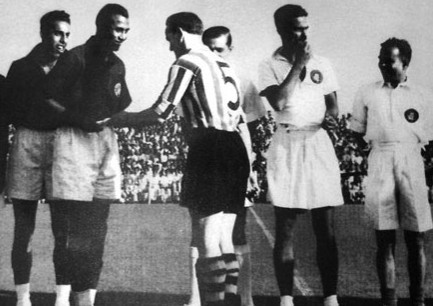Sailendra Nath Manna, a saint among footballers, died on February 27th, aged 87
足球場上的圣徒,賽倫德拉·納斯·曼納,2月27日逝世,終年87歲
THE game of football regularly produces playboys, celebrities, racists, billionaires, fashion models and spoilt brats. What it does not produce is saints; with one exception. When Sailen Manna died, 2,000 people followed his body to the Keoratala burning ghat in Kolkata, on the banks of the Hooghly river that flows out of the Ganges. They acknowledged they had lost rather more than a decent player.
足球這項運動往往讓人聯(lián)想到花花公子、時尚名流、種族主義者、億萬富翁、時裝模特和紈绔子弟。在圣者寥寥的足球場上,賽倫·曼納(Sailen Manna)卻是個例外。他去世后,兩千人簇擁著他的遺體,陪伴他從加爾各答順著恒河支流胡格利(Hooghly)河畔,送他到Keoratala陵園。對于送葬者而言,他們失去的遠不止一名令人尊敬的球員。

With Manna-da—third from left above—tall and strong in defence, newly independent India almost beat France at the London Olympic games in 1948. Under his captaincy, it won its first international football gold medal at the Asian games in 1951. For a very short while, in his time, it walked in the sun as a world-class footballing nation. And it walked barefoot, because, in those years, that was how Mr Manna and his colleagues played.
1948年倫敦奧運會上,憑借后衛(wèi)線上身高體壯的曼納(圖中左起第三),新近獨立的印度險些擊敗法國。在曼納的帶領(lǐng)下,印度又在1951年的亞運會上第一次在國際賽事中摘得足球項目的金牌。雖然僅曇花一現(xiàn),但印度也曾躋身國際足壇前列,頭頂世界級強隊的光環(huán),而且可以說是赤腳打天下,因為在那個年代,曼納和他的隊友都是球場上的“赤腳大仙”。
Yes, he acknowledged later, it often hurt. Bare feet were all very well on the thin, baked surface of the vast Maidan at the centre of Kolkata, where his club, Mohun Bagan AC, had its playing field, and where the worst hazards were straying goats and glass. But on an early away trip to Maharashtra he noted with horror that his rivals had boots, and knew how to use them. In the waning years of Empire, British and Anglo-Indian teams were the worst, aiming for his knees and ankles, or simply trampling him. He lost track of the times his toenails were uprooted. Anklets and plasters helped, or sometimes socks. Pain was muted by the joy of beating the go rasahibs at their own game.
當然,他后來承認光腳踢球經(jīng)常疼得厲害,不過也因地而異。在加爾各答市中心廣闊的麥丹(Maidan)公園的草地稀疏炙熱,在那里赤腳踢球尚無大礙。曼納的球隊莫罕巴干俱樂部(Mohun Bagan AC)在那里訓練,最倒霉不過是踩到山羊糞或者玻璃碴兒。然而,有一次他們?nèi)ヱR哈拉施特拉邦(Maharashtra)比賽,對手都是穿球鞋的而且用鞋對付赤腳的莫罕巴干隊。多年后回憶起來,他仍心有余悸。大英帝國日漸削弱的年代,英國隊和那些英印混血兒隊的球風最為下作,對準他的膝蓋和腳踝踢,或者直接踩上一腳。他不得不連根拔掉腳趾甲,具體是什么時候,他已經(jīng)不記得了。護踝套和創(chuàng)可貼長帶在身上,有時候穿上襪子也可以緩解疼痛。每當在“白人老爺”的地盤贏了球,他滿心喜悅,絲毫不知道痛了。
The reasons for the naked feet varied, even in his own mind. Like most Bengali boys, he could not dream of affording boots. There was no money in football then; Mohun Bagan did not pay him, and he had to buy the maroon and green strip with his own hard-earned cash. But when pretty Princess Margaret asked him whether he wasn’t afraid to play that way, as he balanced a sandwich and a cup of tea at Buckingham Palace after the team’s glorious 1-2 Olympic loss to booted France, he would not mention poverty. They just preferred it, he told her. It was easier to keep the ball under control.
他赤腳足球原因是各種各樣的,甚至曼納腦子里也有多種版本。像大多數(shù)孟加拉邦的孩子一樣,他不敢奢望能買得起球鞋。那時候,足球運動員沒有錢賺;曼納在莫罕巴干俱樂部沒有工資,他的茶色和綠色條紋隊服也是用自己的血汗錢買的。印度隊在奧運會上1比2雖敗猶榮輸給穿鞋的法國隊后,他有幸在白金漢宮(Buckingham Palace)得到了公主瑪格麗特公主(Princess Margaret)的接見。美麗的公主問道,他是不是不怕赤腳踢球。當時,他泰然自若地一手拿著三明治,一手托杯茶,在答話中對窮困只字不提。他告訴公主,他們更喜歡光腳踢球,這樣更容易把球控制住。
Myths gathered round that conversation. Some said Manna-da had told the princess that “Strength is in the mind.” Others said that the king, George VI, had made him roll up his trousers to see if his legs were made of steel. Later versions said that he had played in snow, and certainly he remembered he had at the next Olympics in Helsinki, where ice flakes had been shifted from the field before they played. By then, boots were compulsory; but several players still got frostbite as they lost 1-10 to Yugoslavia, even though it was July. And to his fans Manna-da seemed to play barefoot—agile, skilful and deadly on the free kicks—all through his career.
關(guān)于曼納和公主的談話,民間有各種傳言。有的說,曼納告訴公主“是意志的力量”。其他版本說,英王喬治六世(George VI)讓曼納卷起褲管,要看看他的腿是不是鋼做的。之后發(fā)展的說法是,曼納在雪地里踢過球。他當然記得芬蘭赫爾辛基(Helsinki)1952年奧運會,但是比賽之前先要除掉球場上的雪。那時候,上場比賽必須穿球鞋了。他們1比10輸給了當時的南斯拉夫(Yugoslavia)。雖然正值7月,但是曼納好幾個隊友一場比賽下來還是得了凍瘡。曼納的球迷普遍認為他一生都是赤腳踢球的,而他的任意球更是靈活熟練,足以給對手致命一擊。
The empty cupboard
空空的櫥柜
His feet were a metaphor for other virtues. He played carefully, like a gentleman. In a 20-year career he was never booked, never swore, and fouled no one. As captain, he did not raise his voice to players. He disciplined by example, and would refuse to take food before they had eaten theirs. Though he seldom let opponents past him, he was good friends with them off the pitch—even if they played for MB’s great local rival, East Bengal. He had no enemies. On one occasion the Border Security Force team so hobbled Mohun Bagan with vicious tackling in the drawn semi-final of the Durand Cup that MB could not take the field for the replay. Manna-da calmed down the furious crowd of 20,000 who had come to see the game, and then wished BSF good luck for the final.
他的雙腳也是他諸多美德的象征。他在球場上謹慎小心,像個紳士。20年的足球生涯中,他從來沒有受到裁判的警告,從不罵罵咧咧,更從不犯規(guī)。身為隊長,他從不大聲呵斥隊友。他嚴于律己,以身作則,在隊中總是最后一個吃飯。他很少讓對手輕易過人,但是在場下他和很多球員都是好朋友,包括莫罕巴干的頭號勁敵東孟加拉隊(East Bengal)的球員們。他沒有敵人。有一次在杜蘭杯(Durand Cup)抽簽決定的半決賽中賽中,邊防保安隊(Border Security Force)隊憑著惡意攻擊,讓莫罕巴干隊個個一瘸一拐不能上場重新比賽,激起了全場觀眾的憤怒。曼納平息了兩萬名觀眾的怒火,并紳士般地祝對手決賽好運。
Nor did he care about any of the trappings of the game, or vaunt his glories. Loyally, he played for Mohun Bagan, or coached for it, or acted as assistant secretary and general sounding board, for five decades. He reckoned his total earnings at 19 rupees, or about 20 cents, for travel expenses for forcing his way through the tangled mass of hawkers and buses and rickshaw wallahs on the Howrah bridge when he first joined the club, in 1942. Otherwise, he lived on the money he earned working for the Geological Survey of India.
對于比賽中的陷阱他也不放在心上,更不自吹自擂。他為莫罕巴干盡忠整整50年,要么在隊里踢球,要么當教練、秘書助理或總參謀。他回憶,在1942年剛剛加入俱樂部的時候,他的工資是19盧比,約20美分。這點錢僅夠從家到俱樂部的路費。長長的豪拉(Howrah)橋上,小販、公共汽車和人力車夫交織得密密麻麻,他要創(chuàng)出一條路去踢球。如果不去踢球,他可以在印度地理勘測局(Geological Survey of India)的供職,生活本不必如此辛苦。
His flat in Salt Lake, in eastern Kolkata, did not look like a great footballer’s. He had donated his Asian games gold medallion to the government, even though Pandit Nehru himself had pressed it into his hand. His team ties and blazers he had given to charity. What remained was a photograph or two, and an empty cupboard scratched with messages from friends who had come to call on him.
Memories were his wealth, he told interviewers in his old age. He so loved the game that almost all of them were good; he needed no more. He still regretted missing the first penalty kick against France in the London Olympics, and turning down the chance of taking the second penalty because he was afraid of missing again. It still rankled that India had not gone to the 1950 World Cup in Brazil, with him as captain, because the Indian Football Federation had not realised its importance. He was sorry, too, that India was not even doing well in the Asian games. But he lived in hope of a return of national footballing confidence. No, he was not religious, he would say with a smile. But he kept a picture of Goddess Kali, barefoot conqueror of demons, tucked away in his pocket.
回憶是他的財富,他在晚年接受采訪時這樣說道。他太熱愛足球了,在他眼里足球的一點一滴都是好的;他有了足球心滿意足。不過他仍然后悔在奧運會上錯失對法國隊的點球,也后悔因為害怕再次失手而不敢面對第二次點球機會。作為隊長,心痛的還有看著印度退出1950年的巴西世界杯,因為印度足協(xié)對世界杯的重要性不以為然。他也為印度在亞運會上也黯然失色感到遺憾。但是他還是心存希望,希望有朝一日印度足球重整旗鼓。當被問到是否信教時,他會微笑地說,不。但是他會把迦梨女神(Goddess Kali)的照片妥帖地珍藏在衣袋里。











